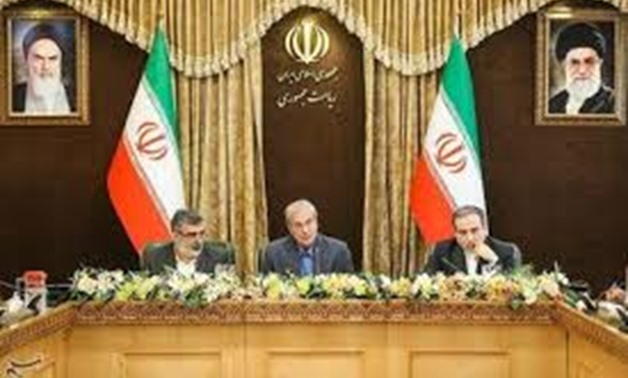
Abbas Araqchi, Iranian deputy foreign minister for political affairs (R), Behrouz Kamalvandi, Iran's Atomic Energy Organization spokesman (L) and Iran's government spokesman Ali Rabiei attend a news conferenece in Tehran, Iran July 7, 2019. Tasnim News Ag
DUBAI (Reuters) - Iran said on Sunday it is fully prepared to enrich uranium at any level and with any amount, in further defiance of U.S. efforts to squeeze the country with sanctions and force it to renegotiate a 2015 nuclear deal with world powers.
In a news conference broadcast live, senior Iranian officials said Tehran would keep reducing its commitments every 60 days unless signatories of the pact moved to protect it from U.S. sanctions.
“In a few hours the technical process will come to an end and the enrichment beyond 3.67% will begin,” said Behrouz Kamalvandi, the spokesman for Iran’s Atomic Energy Organisation.
“And tomorrow early in the morning, when the IAEA (U.N. nuclear watchdog) takes the sample we would have gone beyond 3.67%.”
Under the pact, Iran can enrich uranium to 3.67% fissile material, well below the 20% it was reaching before the deal and the roughly 90% suitable for a nuclear weapon.
Kamalvandi said Iran would enrich uranium for use in fuelling its Bushehr power plant, to the level of 5%, confirming what Reuters reported on Saturday.
“We are fully prepared to enrich uranium at any level and with any amount,” he said.
Iran shows no sign of caving in to pressure from U.S. President Donald Trump in a confrontation that has taken on a military dimension, with Washington blaming Tehran for attacks on oil tankers, and Iran shooting down a U.S. drone, prompting aborted U.S. air strikes.
Long-tense relations between Tehran and Washington took a turn for the worse in May 2018 when Trump pulled out of the 2015 nuclear deal reached before he took office, and reimposed sanctions.
Trump argues that the deal is too weak because some of its terms are not permanent, and because it does not cover non-nuclear issues such as Iran’s ballistic missile program and regional aspirations.
TEHRAN PRESSURES EUROPEAN POWERS
Iran’s announcement challenging Washington is a test of European diplomacy. The Europeans, who opposed last year’s decision by Trump to abandon the agreement, had pleaded with Iran to keep within its parameters.
Tehran has expressed frustration over what it says is the failure of European parties to the agreement to salvage the pact by protecting Iran’s economic interests from U.S. sanctions.
“European countries have failed to uphold their commitments and they are also responsible,” Abbas Araqchi, Iran’s senior nuclear negotiator, told the news conference in Tehran.
“The doors of diplomacy are open but what matters are new initiatives which are required.”
In a sign of heightening Western concern, French President Emmanuel Macron said he and Iranian President Hassan Rouhani had agreed to seek conditions for a resumption of dialogue on the Iranian nuclear question by July 15.
Under the 2015 deal between Iran and six powers, most international sanctions against Tehran were lifted in return for limitations on its nuclear work.
Those restrictions were aimed at extending the time Iran would need to produce a nuclear bomb, if it chose to, to a year from roughly two to three months.
Iran says its nuclear program is only for peaceful purposes, such as power generation, and not to make bombs.
Iran’s main demand - in talks with the European parties to the deal and as a precondition to any talks with the United States - is to be allowed to sell its oil at the levels before Washington pulled out of the agreement and restored sanctions.
Iranian crude exports were around 300,000 barrels per day or less in late June, industry sources said, a fraction of the more than 2.5 million bpd Iran shipped in April 2018, the month before Trump withdrew from the nuclear deal.
Israel’s energy minister described as moderate on Sunday the announced increase of Iranian uranium enrichment but accused Tehran of breaking internationally agreed limitations on its nuclear projects and moving towards a potential bomb.
“It means ... that it is brushing off the red lines that were agreed (and) that it has begun its march, a march that is not simple, towards nuclear weaponry,” Yuval Steinitz, a member of Prime Minister Benjamin Netanyahu’s security cabinet, told Israel’s Ynet TV.


Comments
Leave a Comment